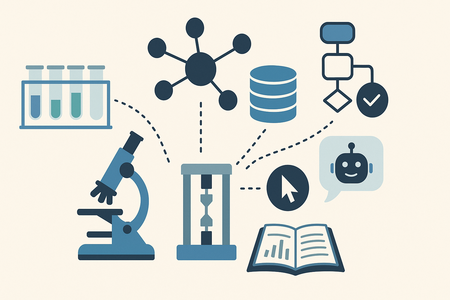
IUC13 develops a co-creation environment that democratizes access to linked data resources and knowledge graphs in materials science. This use case focuses on implementing FAIR principles through an intuitive interface that enables researchers to create, manage, and interact with semantic structures for scientific data and workflows without requiring deep technical expertise. The OpenSemanticLab framework serves as the backbone, providing low-threshold access to knowledge graph operations through editor interfaces, interactive visualizations, filterable tables, and detailed linked data views. The importance of this IUC lies in bridging the gap between sophisticated semantic technologies and everyday research practice. Many materials scientists struggle with the technical complexity of linked data systems, creating barriers to FAIR data adoption. This environment combines existing data and services developed within Mat-o-Lab with AI-supported tools (including LLM chatbots) to enable researchers to create MWO-compliant Findable Data Objects (FDOs) through simple code lines, mouse clicks, or natural language interactions. This approach transforms data management from a technical burden into an accessible, collaborative process that enhances research reproducibility and knowledge sharing across the materials science community. TA-SAI benefits significantly from IUC13 as it provides the practical implementation layer for semantic asset development and deployment. This use case directly supports TA-SAI's mission by offering concrete tools for ontology interaction and knowledge graph population that materials researchers can actually use in their daily work.
| Main requirements: - Stable MWO - Schematized MSE-Knowledge Graph |
| Main Task Area: TA-SAI Other related Task Areas: TA-MDI, TA-WLE |
| Possible connections within NFDI: NFDI4Ing, FAIRmat, NFDI4Chem, Base4NFDI, NFDI4DataScience |
| Material/Data: Data and services developed within the context of Mat-o-Lab, including an OpenSemanticLab instance as knowledge graph interface |
| Main Success Scenario: AI-supported co-creation environment for semantic assets (terminologies, schemas, FDOs and workflow orchestration). User can create MWO-compliant FDOs with a few code lines, mouse clicks or words to an LLM chatbot. |
| Added value for the MatWerk community: Low entry level and robust way to interact with linked data and knowledge graphs. |
PP20 Mat-o-Lab contributes the foundational OpenSemanticLab technology, semantic development expertise, and LLM integration capabilities as well as two active use cases including the relevant data sets and community: For polymer research applications, the IUC13 results will be used to implement comprehensive value chain provenance that capture composition, processing parameters, and multi-modal characterization results in semantically linked formats, enabling researchers to explore and compare complex datasets across different material systems and processing conditions. For hydrogen materials research, the support enables semantic workflow orchestration in the pyiron workflow environments, where multi-scale simulation workflows are not only executed but also semantically described and persistently stored for systematic assessment, comparison, and knowledge extraction across different hydrogen storage, transport and conversion scenarios.
NFDI-MatWerk
Funded by the Deutsche Forschungsgemeinschaft (DFG, German Research Foundation) under the National Research Data Infrastructure – NFDI 38/1 – project number 460247524.
NFDI-MatWerk
Funded by the Deutsche Forschungsgemeinschaft (DFG, German Research Foundation) under the National Research Data Infrastructure – NFDI 38/1 – project number 460247524.
Subscribe to our newsletter for regular updates about materials science topics!
After subscribing, you will receive an email from us with a confirmation
link.
Only after clicking this link your registration is completed.